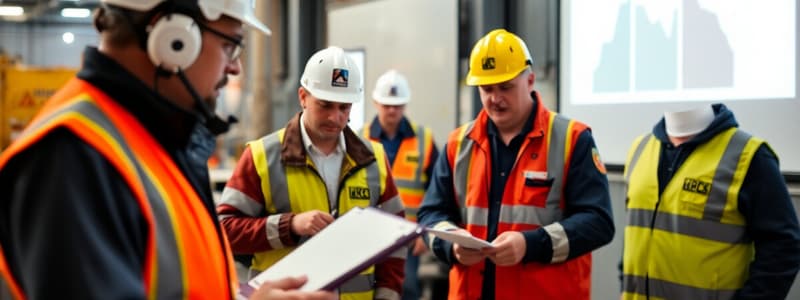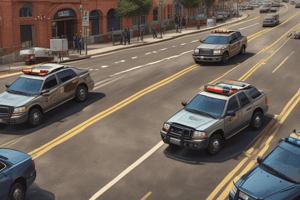Podcast
Questions and Answers
What is the effective date of the Rail Industry Safety Induction Handbook?
What is the effective date of the Rail Industry Safety Induction Handbook?
- November 2015
- February 2016
- January 2016
- December 2015 (correct)
Who authorized the Rail Industry Safety Induction Handbook?
Who authorized the Rail Industry Safety Induction Handbook?
- Director of Safety and Environment
- Group Manager Safety and Accreditation (correct)
- Safety Officer
- Group Manager Quality Control
What version of the Rail Industry Safety Induction Handbook is currently available?
What version of the Rail Industry Safety Induction Handbook is currently available?
- Version 5.0
- Version 6.0
- Version 5.2
- Version 5.1 (correct)
Where can the current documents related to the Rail Industry Safety Induction Handbook be found?
Where can the current documents related to the Rail Industry Safety Induction Handbook be found?
What restriction is placed on reproducing content from the Rail Industry Safety Induction Handbook?
What restriction is placed on reproducing content from the Rail Industry Safety Induction Handbook?
What is the primary purpose of incident investigations in the workplace?
What is the primary purpose of incident investigations in the workplace?
When an urgent response is required, which of the following should be contacted?
When an urgent response is required, which of the following should be contacted?
In a hazardous incident, which of the following is NOT considered an immediate hazard?
In a hazardous incident, which of the following is NOT considered an immediate hazard?
What responsibility does a worker have regarding Personal Protective Equipment (PPE)?
What responsibility does a worker have regarding Personal Protective Equipment (PPE)?
Which of the following details is important to provide during an urgent response?
Which of the following details is important to provide during an urgent response?
What should you do if you are required to participate in an incident investigation?
What should you do if you are required to participate in an incident investigation?
Which of the following is an example of an immediate hazard during an incident?
Which of the following is an example of an immediate hazard during an incident?
Which entity is responsible for providing proper PPE to employees?
Which entity is responsible for providing proper PPE to employees?
What type of track configuration consists of two parallel tracks for trains to travel in opposite directions?
What type of track configuration consists of two parallel tracks for trains to travel in opposite directions?
Where are fixed signals typically positioned in relation to the track?
Where are fixed signals typically positioned in relation to the track?
Which track configuration would allow trains to travel in both directions on a single track?
Which track configuration would allow trains to travel in both directions on a single track?
What is a key characteristic of single lines in railway track configurations?
What is a key characteristic of single lines in railway track configurations?
What must be done with Railway Track Signals when they are not in use?
What must be done with Railway Track Signals when they are not in use?
What warning is associated with railway track signals?
What warning is associated with railway track signals?
What type of number do fixed signals for the Up direction display?
What type of number do fixed signals for the Up direction display?
What does the term 'multiple lines' refer to in track configurations?
What does the term 'multiple lines' refer to in track configurations?
In bidirectional areas, how are fixed signals arranged?
In bidirectional areas, how are fixed signals arranged?
In double line configurations, what is the distinction between the UP and DOWN tracks?
In double line configurations, what is the distinction between the UP and DOWN tracks?
What is the purpose of the identification sign on fixed signals?
What is the purpose of the identification sign on fixed signals?
When would track configurations be particularly critical to understand?
When would track configurations be particularly critical to understand?
Why should Drivers not rely solely on fixed signals for determining expected train movements?
Why should Drivers not rely solely on fixed signals for determining expected train movements?
What could be a consequence of an uncontrolled use of railway track signals?
What could be a consequence of an uncontrolled use of railway track signals?
What do Railway Track Signals indicate to Drivers?
What do Railway Track Signals indicate to Drivers?
What happens to fixed signals in specific situations where visibility is compromised?
What happens to fixed signals in specific situations where visibility is compromised?
What should a worker do before starting at a new location?
What should a worker do before starting at a new location?
What is one way to reduce the risk of slips, trips, and falls?
What is one way to reduce the risk of slips, trips, and falls?
What does the term 'detonator' refer to in railway terminology?
What does the term 'detonator' refer to in railway terminology?
What is ballast in railway terms?
What is ballast in railway terms?
Which phrase best defines a 'competent worker'?
Which phrase best defines a 'competent worker'?
What should be done immediately after experiencing a slip, trip, or fall?
What should be done immediately after experiencing a slip, trip, or fall?
How is an automatic signal typically controlled?
How is an automatic signal typically controlled?
What is a primary function of trackside telephones?
What is a primary function of trackside telephones?
Flashcards
Incident Reporting
Incident Reporting
Reporting all incidents, accidents, and near misses, regardless of severity, immediately or as soon as possible to the supervisor, using the Incident Reporting Form.
Incident Investigation
Incident Investigation
A process for analyzing incidents to understand their causes, ultimately preventing future incidents.
PPE
PPE
Personal Protective Equipment needed for all tasks, provided for use and maintenance by the supervisors.
Railway Track Signals
Railway Track Signals
Signup and view all the flashcards
Track Configurations
Track Configurations
Signup and view all the flashcards
Fixed Signals
Fixed Signals
Signup and view all the flashcards
Trackside Telephones
Trackside Telephones
Signup and view all the flashcards
Slips, Trips, and Falls
Slips, Trips, and Falls
Signup and view all the flashcards
Rail Industry Terminology
Rail Industry Terminology
Signup and view all the flashcards
Study Notes
Document Information
- Version: V 5.1
- Effective Date: December 2015
- Publisher: Safety, Environment, Quality and Risk Group
- Authorised by: Group Manager Safety and Accreditation, Sydney Trains
Copyright
- Copyright belongs to Sydney Trains, 2015
Incident Reporting
- Report all incidents, accidents, and near misses, regardless of severity.
- Report immediately, or as soon as practicable to the supervisor.
- Use the Incident Reporting Form, available on the Sydney Trains intranet.
- Report details include:
- Date and time of incident
- Location of incident
- Description of the incident
- Injuries sustained
- Persons involved
- Witnesses
- Cause of the incident
- Action taken
- Recommendations for further investigation
- Relevant documentation
Incident Investigations
- Sydney Trains has a process for investigating and analyzing incidents to determine the cause.
- Participation in investigations is crucial as findings result in safety actions to prevent future similar incidents.
Personal Protective Equipment (PPE)
- All personnel must wear appropriate PPE for all tasks.
- Supervisors provide instructions on the correct use and care of PPE.
- It is the responsibility of each worker to use and maintain PPE in accordance with procedures.
Railway Track Signals
- Also known as detonators.
- Small explosive devices attached to the rail.
- Used to warn drivers of rail traffic.
- The number of detonations indicates what action the driver must take.
- When not in use, they must be secured in a locked cabinet or container.
- Only trained personnel should use Railway Track Signals.
Track Configurations
- Sydney Trains network uses various working configurations that determine the direction of rail traffic.
- Include:
- Single lines
- Double lines
- Bidirectional lines
- Multiple lines
- Parallel lines
Fixed Signals
- Convey information to drivers about the route and the indication of the next signal.
- Typically located on the left-hand side of the track in the direction of travel.
- May also be positioned above the track on a gantry, or on the right-hand side.
- Bidirectional areas have signals on both sides of the line.
- All fixed signals have an identification sign with letters and numbers.
- Up direction signals display even numbers, Down direction signals display odd numbers.
Trackside Telephones
- Located on signals and trackside infrastructure across the Sydney Trains Network.
- Connect to a signal box or control center.
- Network control officers can be contacted by using any trackside phone.
- Familiarize yourself with the location and operation of these phones at new locations.
Slips, Trips, and Falls
- Minimize risk by:
- Regularly inspecting work environments for hazards.
- Consulting supervisors to ensure good housekeeping, safety signage, and adequate lighting.
- Reporting any slips, trips, or falls immediately to the supervisor.
- Educating new employees, contractors, and visitors about hazards present in the work area.
Rail Industry Terminology
- Railway Track Signal - A device fixed to the rail that explodes upon impact and attracts the attention of drivers and track vehicle operators. Also known as a detonator.
- Automatic Signal - A signal that is typically controlled by the operation of track circuits.
- Ballast - Blue metal used as the foundation for track.
- Competent Worker - A worker certified as competent to carry out the relevant task.
Studying That Suits You
Use AI to generate personalized quizzes and flashcards to suit your learning preferences.
Related Documents
Description
This quiz covers the essential procedures for reporting and investigating incidents within Sydney Trains. Participants will learn about the required details for incident reporting, as well as the systematic process for carrying out thorough investigations. Understanding these protocols is critical for maintaining a safe work environment.




